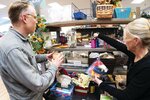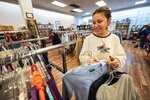














“Rachel Jones” (her real name has been changed to protect her privacy) grew up in an affluent suburban New Jersey town. An only child, she recalls spending fun weekends with her aunts, uncles and cousins.
“I came from a very good upbringing,” she says. “I literally had the white house with the white picket fence.”
But soon after she turned 13 something “traumatic happened to me that altered my life completely,” she says without being specific. “I just didn’t trust anybody. I didn’t understand what happened to me and why it happened to me. I was just shattered and broken.”
Rachel started using drugs and getting kicked out of alternative schools for behavioral issues. By age 18, she was pregnant, happy, and clean for a while. But four years later, Rachel broke up with her daughter’s father and turned back to drugs. She lost her apartment, wrecked her car, and needed money to afford her addiction. With no other alternative, she turned to stripping.
After one of her many stints in rehab, Rachel was placed in the Atlantic City Rescue Mission in a city best known for gambling and prostitution. Eventually, she met a guy who whispered in her ear that she should start turning tricks when money got tight. She worked the mean streets of AC for about a year, becoming tough-as-nails “Jenny” to help her survive.
“There were certain situations I put myself in that I don’t think Rachel would have survived,” she says. “Jenny ruled my life and got me through everything.”
After one arrest for prostitution and drugs, a detective connected her with NOVA, which assists victims of domestic violence. Rachel was offered a choice of three programs to get straightened out, one of which was a Christian-focused program set on an 82-acre farm in Upper Bucks County.
***
Law enforcement experts say human trafficking — a form of modern slavery that includes the sex trade and forced labor — is the second-largest criminal industry in the world, with more than 800,000 people trafficked against their will across international borders each year.
The U.S. Department of Justice says its attorneys received 2,207 referrals for human trafficking offenses in 2021, a 49% increase from the 1,360 referred to them in 2011. During the same time, prosecutions more than doubled, from 729 to 1,672.
Studies have shown nearly 800 young people become homeless every year in the Greater Philadelphia area; about 40% of them are approached by a trafficker within 48 hours.
“Human trafficking exists in Bucks County, often in the shadows,” says Bucks County District Attorney Matt Weintraub.
Dan Emr knew nothing about human trafficking until 2010 when a young couple came to Calvary Church in Hilltown to talk about the work they were doing overseas to help young women caught in the web of human trafficking. Emr was both stunned and moved by the couple’s story.
“It shook me to my core,” recalls Emr, who was 28 at the time. “I wondered what my role could be in helping to stop it. I knew I needed to be a part of the solution and not sit idly by.”
Emr need only look at his parents for that sense of duty. When he was 12, they sold their 18-acre property on Ridge Road in West Rockhill so they could take their family on what turned out to be a nine-year missionary trip to Ukraine. Emr, who was used to spending vacations in Cancun, thought they were going “to the white sands of Ukraine,” he says with a laugh. The experience, he says, taught him “what it means to set personal comforts aside to better serve others.”
Two years after the couple stopped by Calvary, Emr, married with two kids and living in Sellersville, gave up his comfortable job in marketing and sales for a local engineering firm to open a clothing factory in India staffed by survivors of trafficking. Its brand: “Worthwhile Wear.” Its goal: Allowing everyone to “Wear the Story of Freedom.”
In 2014, he launched Worthwhile Wear in the U.S. It has grown to offer the most comprehensive services to survivors of trafficking in Pennsylvania. What started with one employee — Emr — has grown to a staff of 80+ full- and part-time workers, plus hundreds of volunteers. The organization operates on a $3.5 million annual budget, much of which comes from sales at its thrift stores in Plumsteadville and Collegeville, with a third location to open soon. It preaches a message of hope and healing to between 150 and 250 survivors a year.
“For those who escape, the road to healing requires a comprehensive response,” says Emr. “It’s not enough to offer a single solution, which is why Worthwhile Wear utilizes a multi-pronged approach to address this growing issue.”
When a trafficking survivor comes to Worthwhile Wear, either through referrals from law enforcement or one of the 79 social service agencies it works with, the first step is the “Worth It” program. A series of classroom experiences, it is designed to help participants address unresolved trauma, connect with area service providers, maintain sobriety and ultimately break the cycle of exploitation. Worthwhile Wear provides free lunch and snacks, transportation to and from class, and follow-up services.
Perhaps most importantly, survivors who complete the “Worth It” program are eligible for Worthwhile Wear’s long-term housing program at The Well, an 82-acre property at an undisclosed location in Upper Bucks. Developed primarily as a safe house, The Well’s residential program provides secure housing — for up to two years — as a refuge from social, psychological, and economic factors that could trigger a relapse or re-exploitation.
Services are provided free of charge and are aimed at developing a foundation of recovery and stability, Emr says, with a goal of survivors leading independent and healthy lives. Residents receive vocational training and a job at one of the Worthwhile Thrift stores. Meals, clothing and transportation are provided. They also learn essential life skills — financial literacy, grocery shopping and cooking — receive nutrition and exercise guidance, and participate in creative (art, music, and writing), and recreational (rock climbing, horseback riding, and cycling) activities.
Working with tutors provided by Worthwhile Wear, many survivors earn GEDs, college degrees, and certifications in various industries that offer high-paying jobs.
At graduation from The Well, Emr says, survivors have access to three mentors, about $10,000 in savings, a reliable vehicle and safe, affordable housing. Some move on to Meleny’s House, a three-unit apartment building in a converted parsonage donated by Emmanuel Lutheran Church in Souderton.
The program has about a 75% success rate, according to Emr. He says of those who don’t make it all the way through, “We know we’ve helped them understand their value and worth and that resources are available.”
Emr says he is especially proud of one survivor who recently sent him a note of thanks.
“She had been in and out of halfway houses, treatment centers, 17 other programs,” he says. “She said we were the only ones who saw her as an individual and helped address her trauma.”
Weintraub is a big supporter of Worthwhile Wear’s work, making sure victims know law enforcement officers and prosecutors are “not out to get you,” he says. “We’re here to help.”
Worthwhile Wear, he says, has made “incredible strides in not only bringing this issue to light but by empowering survivors of human trafficking to break free from their figurative bonds. They are an incredible resource for us in law enforcement.”
Emr believes awareness is an essential tool in breaking the cycle of human trafficking. He’s a frequent guest speaker in the community and a prolific podcaster. Over the past year, Worthwhile Wear reached about 220,000 individuals nationally through speaking engagements, podcasts, shopping in their stores, online engagement and special events.
Four years ago, he launched the Act Challenge, a three-month window that starts May 1 and concludes July 30, which is World Day Against Trafficking. During that time, individuals, groups, businesses, schools, and churches unlock pledged dollars with every mile they log. This year, the effort raised $102,000 with 195,000 miles logged.
“When people hear about human trafficking, they want to act and get involved,” says Emr, “So we created a way for people of all ages, abilities, and locations to join with us in providing care to survivors while also raising awareness about this growing issue.”
Emr says he hasn’t once regretted his family’s decision to allow him to step away from a career that afforded them a comfortable lifestyle.
“Knowing that my days are spent helping women experience freedom and realize their true worth, has made each day a rewarding one,” he says.
***
At first, Rachel was reluctant to even consider The Well. The lush countryside of Bucks County seemed like a world away from the gritty streets of Atlantic City where she had become comfortable.
“But I knew in the back of my mind if I didn’t want to do it, it was probably the best place for me to go,” she recalls.
On her way into the property for the first time, Rachel freaked out when she saw a wild turkey scurry across the driveway. That night, she cried herself to sleep.
“I just did not want to be here,” she says. “I was broken down, Just feeling unworthy.”
Eventually, she began setting goals. Survive today. Survive this week. Survive this month. Telling herself over and over that “everything will be okay.”
She says the dedication of the staffers and the volunteers who were dedicated to helping her improve made all the difference.
A turning point came when Rachel opened her first paycheck after working at Worthwhile Thrift sorting donations and being a cashier.
“It was a huge thing for me to know that I earned that money,” she says.
Since leaving Worthwhile Wear, Rachel, now in her late 20s, has become a certified recovery specialist and works with women in Atlantic City who are being trafficked. She also provides training on human trafficking to law enforcement officers.
“It’s crazy to think that I’m now training some of the same law enforcement officers that had once arrested me,” she says.
Without her experience at The Well, Rachel isn’t sure where she would be today.
“The Well is definitely the most rewarding thing that I’ve ever done for myself because I lost who Rachel was years ago and I buried her deep, deep down inside me,” she says.
“Today, I’m proud to call myself Rachel.”
Join our readers whose generous donations are making it possible for you to read our news coverage. Help keep local journalism alive and our community strong. Donate today.